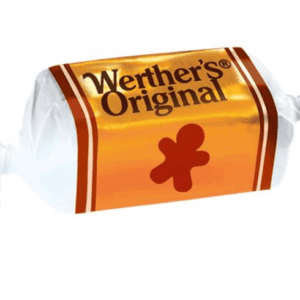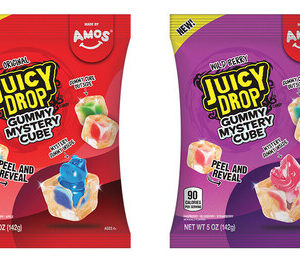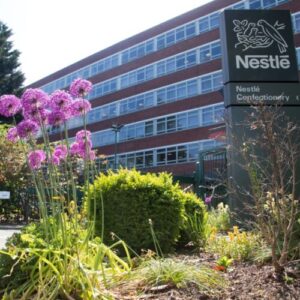Strategy for success

Confectionery Production caught up with Alan Gundle, managing director of the Mondelēz International Global Science and Technology Research Centre in Reading, UK.
What is your background?
I’ve been in the food and drink manufacturing industry since graduating from university with a chemical engineering degree. I joined the business in Munich back in 1993 and have been working across a variety of food categories ever since – from cheese to chocolate and coffee to candy.
Much of my time has been spent abroad. Having started in Germany, I’ve also done stints in Switzerland, Spain and Chicago, working on everything from the initial topline research in the laboratory to final factory implementation.
When I moved back to the UK, my focus for 10 years became coffee. This gave me an opportunity to have a long-term impact on the products – challenging competitors and making profound shifts in coffee development. It then felt natural to move to head up Mondelēz International’s Global Science and Technology Research Centre in Reading when I was given the opportunity 18 months ago.
What is your area of focus within the confectionery industry?
The Reading Science Centre is at the heart of research, development and quality control throughout the Mondelēz International business and is central to creating innovative new products. Our laboratory research underpins the science that works across all of the company’s categories, which in addition to chocolate and candy include coffee, cheese and biscuits.
Our role is to deepen our understanding of our key ingredients so that we can innovate with them. For example, we investigate the functionality of milk so that we that we understand its properties and can then apply what we know to best effect in our chocolate products, as well as in cheese and coffee.
Cocoa and coffee have been used for hundreds of years, yet there is still plenty to learn about them. Our work is especially powerful as we don’t work in silos – our expert scientists are able to share their knowledge across categories, which allows us to learn faster and create truly exciting products.
What are the major challenges within the sector?
Food manufacturers like us are currently striving to improve all areas of their businesses – from sustainability initiatives to promoting healthy lifestyles. We’ve recently announced global commitments to wellbeing across the company to focus our efforts and ensure we deliver across the board.
Some of these goals rely heavily on our scientific expertise – such as sodium reduction and lowering calorie count. The work that we’re doing in Reading is at the forefront of these developments and we’re tackling the challenges head on every day.
We’re also challenged with main-taining a sustainable pipeline of talent. We want to find dedicated people who have the scientific background but also the passion and patience needed for a research role. That’s why we’ve introduced our vocational trainee scientist programme through which we’re hiring school leavers with science A levels to get on the job lab training and join our teams – without the need for a university degree.
How have things changed/developed within the category over the past five years?
There has been a definite shift in snacking behaviour, as people now snack little and often, opening up scope for a wider variety of both sweet and savoury treats. There is also a desire for a more customised approach. People now want coffees flavoured with caramel and new sweets with unusual inclusions. We developed Cadbury Dairy Milk Marvellous Creations with this in mind – giving the consumer something unexpected in a chocolate bar.
Within the research industry, we’ve noticed that companies are outsourcing more of their research as they strive to meet global targets and consumer expectations. This trend has benefited us as the Reading site is also home to RSSL, an independent global research company that is a subsidiary of Mondelēz International. This means that the scientists based here are at the forefront not just of confectionery research, but of all scientific developments from food to pharmaceuticals.
How do you see things changing in the next few years?
Consumers are much more mindful of what companies are doing to improve their processes and products, as well as what they are consuming. Many are looking to companies to make sensible choices for them; they want products that are just as satisfying but healthier, more sustainable and better for the environment. The industry as a whole is coming on leaps and bounds, but the next few years will be crucial when it comes to separating those businesses that have invested and improved, and those that are not prioritising these issues.
What, in your opinion has been the biggest breakthrough in the sector over recent years?
Some of the products we’re working on are really going to change the confectionery market. For many years we’ve been working on developing heat resistant chocolate for hotter countries, which is something I’m very excited about.
We’ve also hit some of our key sustainability targets early. For example, all our palm oil now comes from sustainable sources. This has been a massive collective effort by all parts of the business and something we can be really proud of.
What was the thinking behind Mondelēz International’s £17m (€21m) investment in its UK research and development network?
Over the past three years the company has channelled more than £17m (€21m) into UK research and development across its Bournville, Banbury and Reading sites. The funds were vital for securing the research, development and quality control capabilities that have had such a great impact on the innovation of our products.
In 2012 we upgraded our microscopy lab to make it state of the art – a £500,000 (€607,000) investment. The 3D imaging technology is usually only found at academic institutions so it has been fascinating to apply it to commercial projects and use it to meet our aim of understanding our ingredients at a deeper level.
We will also be opening 4,000sq ft of new lab space this month, which will allow us to comfortably expand our team of scientists and our areas of research.
As the global centre for research, all eyes are on us. We are also keen to convey what we learn as fast as possible so we can accelerate innovation in our bases in other countries. We’ve got a hub and spoke model that allows us to share our findings with teams across the world.
How will the success of such a strategy be measured?
We need to continue to create products that are underpinned by brilliant science and also popular with consumers.
If over time our portfolio maintains its top-class position, then we are succeeding. We have strong research, development and quality control capabilities, but must not rest on our laurels as we need to ensure that we add to our successes year on year with innovative products that excite confectionery fans.






